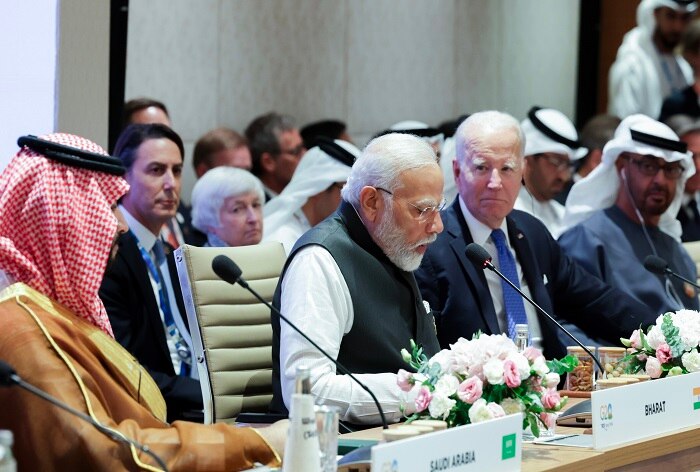G20 Summit: All states must refrain from the threat or use of force to seek territorial acquisition against the integrity and sovereignty or political independence of any state, a statement by Delhi Declaration stated on Saturday.

New Delhi: With the 37-page document addressing key issues including the Ukraine war, G20 leaders on Saturday reached a consensus on Day 1 of the G20 Summit and said the ‘use or threat of use of nuclear weapons is inadmissible. Without mentioning Russia, the G20 member countries recalled the Bali declaration and highlighted that all states must act in a manner consistent with the Purposes and Principles of the UN Charter in its entirety and called for a “comprehensive, just, and durable peace in Ukraine” and reminded member states to “refrain from the threat, or use of force, to seek territorial acquisition”.
“Concerning the war in Ukraine, while recalling the discussion in Bali, we reiterated our national positions and resolutions adopted at the UN Security Council and the UN General Assembly and underscored that all States must act in a manner consistent with the Purposes and Principles of the UN Charter in its entirety. In line with the UN Charter, all states must refrain from the threat or use of force to seek territorial acquisition against the territorial integrity and sovereignty or political independence of any state. The use or threat of use of nuclear weapons are inadmissible,” the joint declaration read.
How Is Delhi Declaration Different From Bali Declaration?
Interestingly, the language adopted in the declaration marks a departure from the strong condemnation of Russia’s war in Ukraine in the Bali document.
‘Bali was Bali, Delhi is Delhi’: Jaishankar
Giving details about the change in language in the Delhi Declaration from the Bali document on Ukraine war, External Affairs Minister Jaishankar said, “Regarding the change in language on the Russia-Ukraine conflict from the Bali Declaration – Bali was Bali, New Delhi is Delhi. Many things have happened since the Bali Declaration.”
He went on to add that one should not have a theological view of this as the New Delhi Declaration responds to the situation as it stands today.
Delhi Declaration Responds to Today’s Concerns
He further stated that the New Delhi Declaration responds to the concerns of today just like the Bali Declaration responded to the concerns of that time.
S Jaishankar also talked about the efforts made in reaching a consensus on the Ukraine issue.
“This is a declaration of 83 paras. There are a lot of subjects covered. But obviously, because of the ongoing conflict and the different views on it, considerable time was spent in the last few days with regard to geopolitical issues which were mostly centred around the war in Ukraine,” Jaishankar said.
Talking about the nations that helped reaching on a consensus on the Ukraine crisis, Jaishankar said, “Everybody came together to forge a consensus, but emerging markets took a particular lead on this and many of us have a strong history of working together. Bear in mind that actually, you have four developing countries in succession for the G20 presidency…Indonesia, us, Brazil and South Africa.”
Historic Moment For India
It was a historic moment as under India’s presidency, 100 per consensus was reached on the New Delhi Declaration on Saturday, the first day of the G20 Summit.
PM Modi’s Earlier Message to Putin
PM Modi’s “today’s era isn’t of war” message to Russian President Vladimir Putin in the backdrop of the Ukraine-Russia conflict has become part of the outcome statement of the G20 joint declaration at New Delhi.
Earlier, PM Modi had told Vladimir Putin in a bilateral meeting on the sidelines of the Shanghai Cooperation Organisation summit in Samarkand that, “today’s era not of war”.
“On the Russia-Ukraine crisis, India worked very closely with Brazil, South Africa and Indonesia and it was the emerging markets that played a very key role. India worked with all the emerging markets which played a key role, there were very tough and ruthless negotiations that went on for several days nonstop. In the end, the issue was clinched because of the leadership of the PM…”, said G20 Sherpa Amitabh Kant .
The New Delhi Declaration reaffirmed that the G20 is the premier forum for international economic cooperation and the member countries acknowledged that the G20 is not the platform for Geopolitical and security issues; although these issues can have consequences for the global economy.
